PGLYRP-2 and Nod2 are both required for peptidoglycan-induced arthritis and local inflammation
- PMID: 19218085
- PMCID: PMC2671207
- DOI: 10.1016/j.chom.2008.12.010
PGLYRP-2 and Nod2 are both required for peptidoglycan-induced arthritis and local inflammation
Abstract
Peptidoglycan recognition proteins (PGRPs) are structurally conserved from insects to mammals. Insect PGRPs have diverse host-defense functions. Mammalian PGRPs PGLYRP-1, PGLYRP-3, and PGLYRP-4 have bactericidal activity, while PGLYRP-2 has amidase activity. To extend the known functions of mammalian PGRPs, we examined whether they have immunomodulating activities in peptidoglycan-induced arthritis in mice. We demonstrate that PGLYRP-2 and Nod2 are both required for arthritis in this model. The sequence of events in peptidoglycan-induced arthritis is activation of Nod2, local expression of PGLYRP-2, chemokine production, and recruitment of neutrophils into the limbs, which induces acute arthritis. Only PGLYRP-2 among the four mammalian PGRPs displays this proinflammatory function, and PGLYRP-1 is anti-inflammatory. Toll-like receptor 4 (TLR4) and MyD88 are required for maturation of neutrophils before peptidoglycan challenge. Our results demonstrate that PGRPs, Nod2, and TLR4, representing three different types of pattern-recognition molecules, play interdependent in vivo roles in local inflammation.
Figures
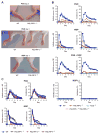
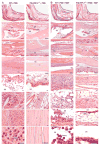
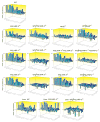

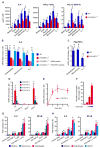
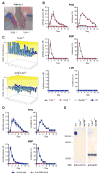
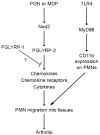
Comment in
-
Mammalian PGRPs in the spotlight.Cell Host Microbe. 2009 Feb 19;5(2):109-11. doi: 10.1016/j.chom.2009.01.007. Cell Host Microbe. 2009. PMID: 19218081 Review.
References
-
- Biragyn A, Ruffini PA, Leifer CA, Klyushnenkova E, Shakhov A, Chertov O, Shirakawa AK, Farber JM, Segal DM, Oppenheim JJ, et al. Toll-like receptor 4-dependent activation of dendritic cells by β-defensin 2. Science. 2002;298:1025–1029. - PubMed
-
- Chamaillard M, Hashimoto M, Horie Y, Masumoto J, Qiu S, Saab L, Ogura Y, Kawasaki A, Fukase K, Kusumoto S, et al. An essential role for NOD1 in host recognition of bacterial peptidoglycan containing diaminopimelic acid. Nat Immunol. 2003;4:702–707. - PubMed
Publication types
MeSH terms
Substances
Grants and funding
LinkOut - more resources
Full Text Sources
Other Literature Sources
Medical
Molecular Biology Databases
Research Materials
Miscellaneous

